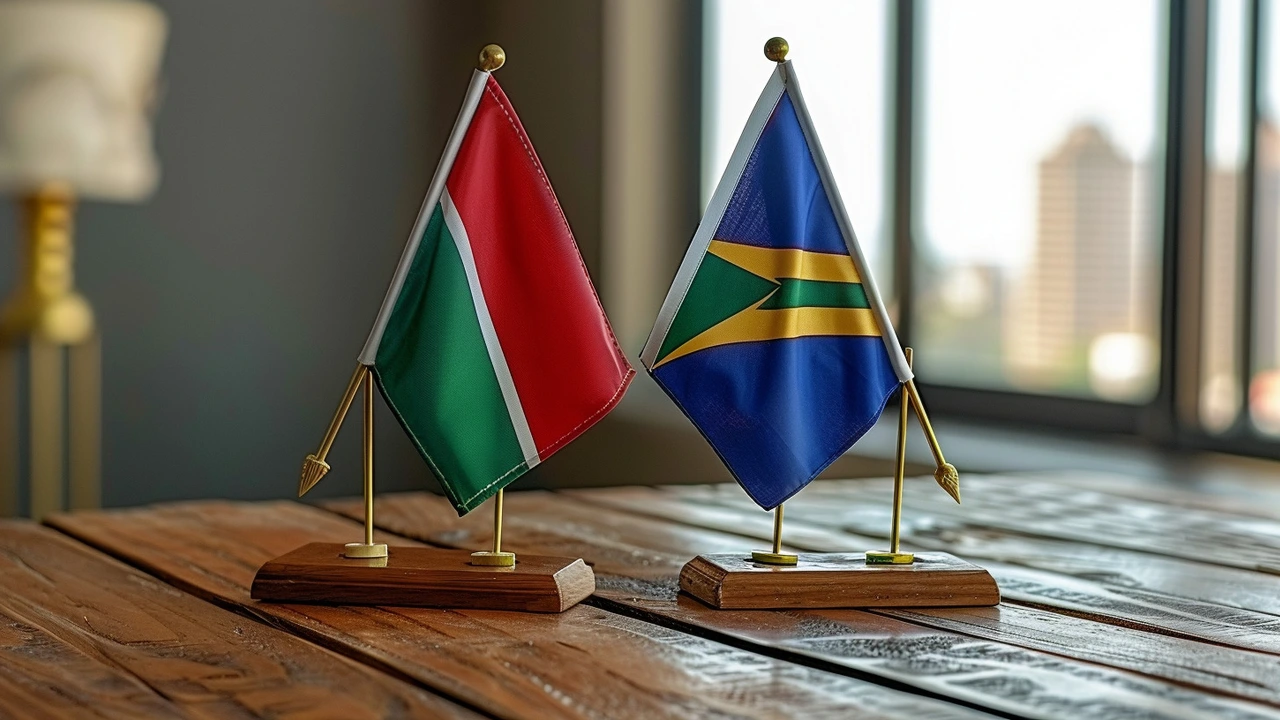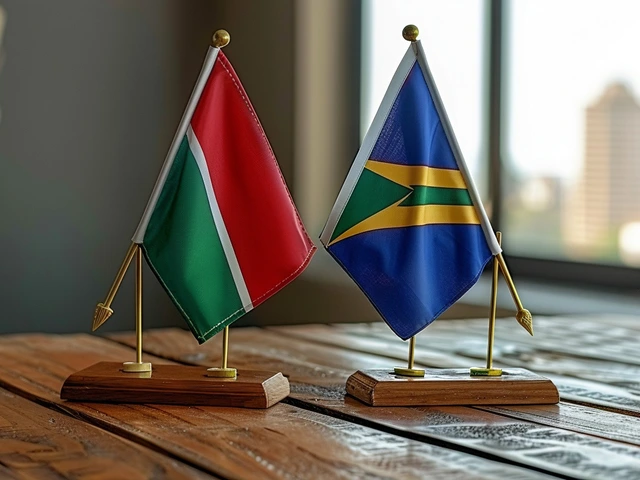SACP Rejects ANC's Proposed Coalition with DA and MKP
The political landscape in South Africa is undergoing significant changes as the South African Communist Party (SACP) firmly positions itself against a coalition government that includes the African National Congress (ANC), the Democratic Alliance (DA), and the uMkhonto weSizwe Party (MKP). The statement was made clear by Solly Mapaila, the General Secretary of the SACP, who stressed that the party is not in favor of such alliances. Instead, the SACP promotes the formation of a minority government characterized by national unity but with restrictive membership that excludes what they describe as neo-liberal forces, predominantly the DA.
Background: ANC's Electoral Loss
This declaration from the SACP comes on the heels of a significant shift in South Africa's political spectrum. The ANC, which historically held a substantial majority, experienced a substantial loss in the most recent elections. The party no longer enjoys the majority of seats and, therefore, has been actively engaging in talks with various opposition parties and political allies to form a new government bid. These talks have ranged from discussions with the Congress of South African Trade Unions (COSATU) to the SACP itself. However, the inclusion of the DA and the MKP in these broader coalition negotiations has struck a discordant note with the communists.
Coalition Challenges
The ANC's approach to forming a coalition government has not been without its complexities and controversies. Central to the discomfort expressed by the SACP is the ideological divergence they have with parties like the DA. The SACP accuses the DA of promoting neo-liberal policies that are fundamentally at odds with the principles and objectives of the communist party. Solly Mapaila's rhetoric was unwavering in this regard, as he underscored the belief that any government configuration that includes the DA would undermine progressive governance and weaken the achievements of the liberation movement.
The MKP Controversy
Moreover, Mapaila reserved strong criticism for the MKP, a party founded and led by former President Jacob Zuma. Despite the MKP earning the third-highest support in the recent elections, the SACP remains apprehensive about its inclusion in the coalition because of its perceived role in destabilizing the broader liberation movement. The MKP's emergence has indeed been a point of contention. For many, Jacob Zuma remains a polarizing figure in South African politics, and his association with the MKP has been viewed by some as an attempt to fragment the ANC's support base further.
SACP's Vision: A Minority Government
Contrary to the coalition model, the SACP suggests that a minority government could be a more suitable alternative, one that promotes national unity without compromising on core principles. Mapaila explained that this approach could potentially offer a balanced way forward, ensuring that progressive policies remain intact and free from the influence of neo-liberal agendas. This suggestion stems from a broader strategy to keep the governance aligned with leftist and socialist ideals, an aspect the SACP staunchly defends.
Negotiations and the Way Forward
A minority government, in the SACP's view, would still uphold democratic principles but would bring together a more ideologically coherent group of parties. This vision sees the exclusion of both the DA, which is seen as too far-right, and the MKP, which is seen as a divisive force within the liberation movement. The SACP's stance is clear: to preserve the integrity of the liberation movement and to continue pushing for policies that are aligned with the needs of the working class and marginalized communities.
Broader Political Implications
The SACP's announcement has broader implications for South African politics. It highlights the ongoing struggle to strike a balance between forming a practical government while adhering to ideological commitments. As various factions within the ANC and its allies navigate these turbulent waters, the future of South African politics hangs in the balance. The discussions and decisions made in the coming weeks will set the course for the nation's governance and could redefine the landscape for future generations.
Conclusion
The backdrop of a fractured political environment poses significant challenges for South Africa. The SACP's firm opposition to a coalition that includes the DA and MKP underscores a critical juncture in the nation's political journey. By advocating for a minority government that prioritizes national unity without compromising core values, the SACP aims to preserve the spirit of the liberation movement and ensure progressive policies guide the country's future.


Ramesh Velusamy
June 7, 2024 AT 23:06bro the SACP is being way too rigid here. DA might be neoliberal but they got votes, ignoring them is just gonna leave the country stuck. we need pragmatism, not purity tests.
Sushil Kallur
June 9, 2024 AT 18:19i understand the ideological stance but south africa needs stability more than ideological purity right now. the people voted for change, not for more infighting.
Chandni Solanki
June 9, 2024 AT 21:02this is so frustrating 😔 we've been through so much and now we're stuck in this loop of old politics vs new reality. why can't we just build something that works for everyone? 🤷♀️
Nitin Garg
June 10, 2024 AT 12:18oh please. SACP acting like they're the only ones who know what's good for black people. DA's not perfect but they're not the devil. you guys are just scared of losing power.
Seema Lahiri
June 11, 2024 AT 03:13i think the real issue here is that the ANC is caught between a rock and a hard place and the SACP is making it worse by refusing to compromise. the working class doesn't care about your ideological purity they just want food on the table and electricity that works
Jay Patel
June 12, 2024 AT 00:34this is the drama we deserve. zuma's ghost haunting the elections da pretending to be a party of reform sACP playing the martyr. we're not building a nation we're building a soap opera
fathimah az
June 13, 2024 AT 17:00the structural tension here is between electoral legitimacy and ideological coherence. if coalition governance is the only viable path to democratic stability, then ideological purism may be counterproductive to long-term structural transformation
Sohini Baliga
June 14, 2024 AT 11:13it is imperative that we prioritize national unity and the well-being of all citizens above partisan ideology. compromise does not equate to betrayal it is the foundation of sustainable governance
Senthil Kumar
June 15, 2024 AT 09:08i believe that dialogue and mutual respect are essential in navigating these complex political challenges. perhaps a minority government could serve as a bridge rather than a barrier
Anu Baraya
June 15, 2024 AT 15:22we can still dream big and build together. the people are tired of division. let's find a way to unite around shared goals not just ideological comfort
Divyangana Singh
June 16, 2024 AT 10:29this isn't just politics it's the soul of a nation being pulled apart by ghosts of the past and the desperate grasp of the present. the SACP wants to freeze history while the DA wants to sell it. neither sees the living people underneath
Harsh Vardhan pandey
June 17, 2024 AT 03:33why do we even care anymore. everyone's just playing games. the poor don't vote they just suffer. let them figure it out
Shatakshi Pathak
June 18, 2024 AT 00:53so you think excluding the DA is the answer? what about the millions who voted for them? are they not part of south africa too? you're not protecting the movement you're just being elitist
kriti trivedi
June 18, 2024 AT 11:50the sACP is acting like they invented socialism. meanwhile the mkp got real votes from real people who are tired of the same old corruption. if you want unity you can't just erase half the electorate